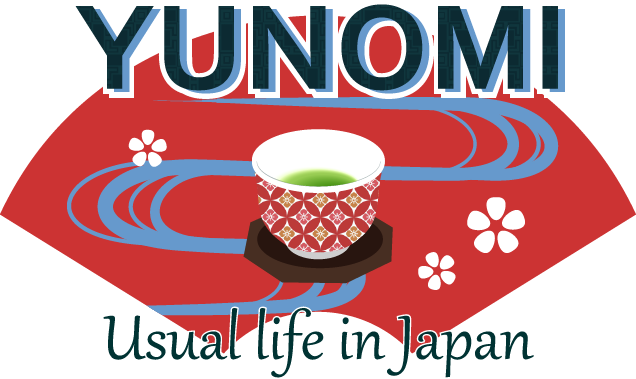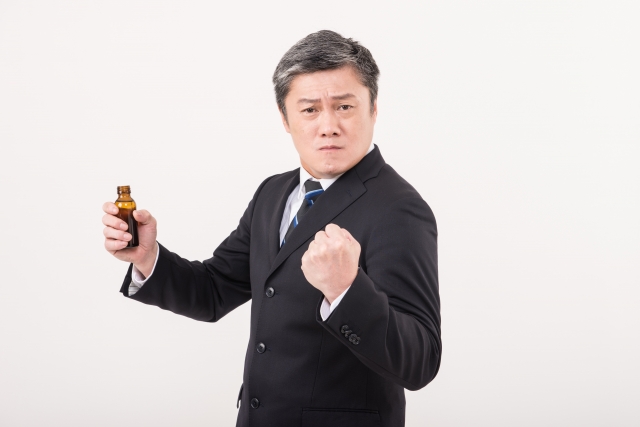Energy drinks are drinks that contain large doses of caffeine and other legal stimulants.
It seems that we have now entered a generation where energy drinks have become so popular among Japanese teenagers and young adults.
Japan has become a really busy and active society. Working hours tend to be long and Japanese people depend on coffee or energy drinks that both contain caffeine to start their day.
Caffeine stimulates your nervous system, giving you energy and causes you to feel more alert of your everyday surroundings, and gives you that extra energy if you have had a lack of sleep.
While some of these drinks contain Chinese herbs and medicines, the nutritional contents generally don't stray too far from popular energy drinks like Red Bull mainly containing water-soluble caffeine, vitamins (primarily B-series), taurine, and niacin.
Popular brands of energy drinks in Japan.
- Lipovitan D Pro
- S-Cup E
- Tough Man
- Oronamin C
- Tiovita
Here is a mini-review on some of the popular energy drink brand market leaders.
Tiovita 2000
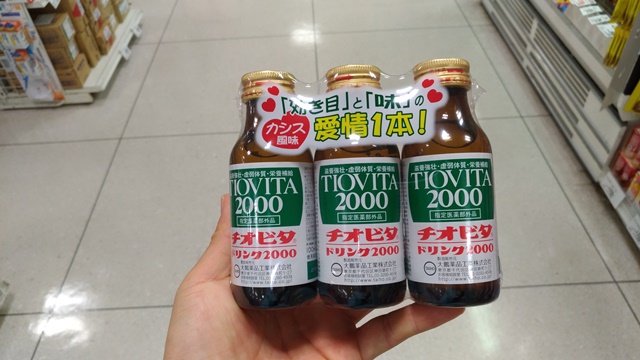
Tiovita 2000 is an energy drink sold by the Taiho Pharmaceutical Company. It is part of the lineup of the company's Tiovita energy drinks. It comes in a 100ml bottle.
Some of the more popular and engaging drinks include the sports drink range.
Tiovita's ingredients are - 2000mg of taurine, 20mg of nicotinamide, 5mg of vitamin B1, 5mg of vitamin B2, 5mg of vitamin B6, 100mg of carnitine, and 50mg of caffeine.
Overall the taste is syrupy and has a slight medicine-like taste.
Lipovitan D Pro
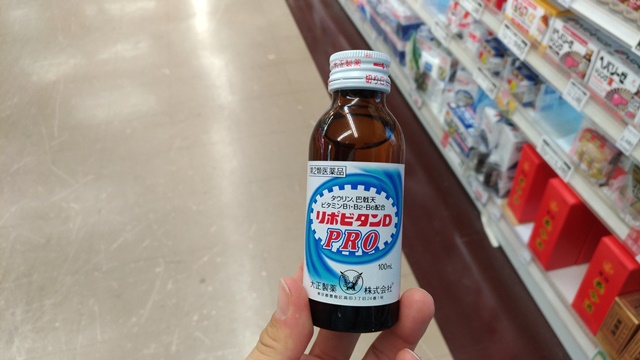
Lipovitan D Pro is an energy drink sold by the Taisho Pharmaceutical Company. It is part of the lineup of Taisho Pharmaceutical's famous "Lipovitan D" series of energy drinks.
The taste of Lipovitan D Pro is just like the regular Lipovitan D; it is sweet like syrup but not fruity.
The drink contains 1000mg of taurine, 0.2mL of Morinda Officinalis extract, 50mg of inositol, 20mg of nicotinamide, 5mg of vitamin B1, 5mg of vitamin B2, 5mg of vitamin B6, and 50mg of caffeine.
S-Cup E
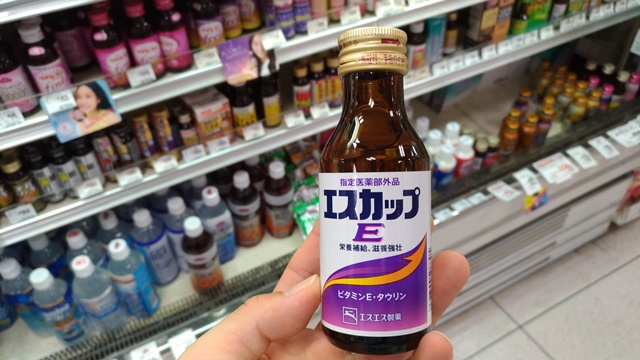
S-CUP E is a quasi-drug energy drink sold by SS Pharmaceutical Company, a company that actually has its roots as far back as the Edo Period. (1600-1868)
"S-CUP" was first sold by the company in 1963. "S-CUP E" is one of the products in the "S-CUP" lineup and is targeted at women.
What makes this energy drink unique is the fact that it contains vitamin E and panthenol.
The drink contains 100mg of vitamin E, 10mg of vitamin B1, 5mg of vitamin B2, 5mg of vitamin B6, 20mg of nicotinamide, 15mg of panthenol, 100mg of inositol, 100mg of carnitine, 500mg of taurine, and 50mg of caffeine.
Compared to the regular S-CUP, this one contains vitamin E, panthenol, and 5mg more vitamin B1, but contains 500mg less taurine.
It also comes in a different glass bottle, with a bottleneck reminiscent of a beer bottle.
The drink has a green apple-like taste to it and is quite sweet. It does not have a strong medicinal flavor to it, so it is easy to drink.
Alinamin 7 Zero
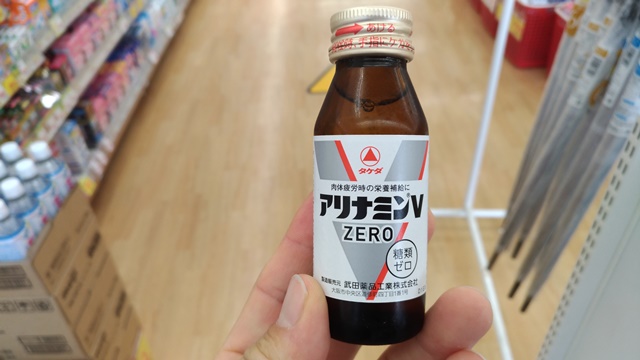
Alinamin 7 Zero is an energy drink sold by the Takeda Pharmaceutical Company. The story goes that the drink was originally invented by a British person Douglas Robertson, by accident.
The drink contains Fursultiamine, a derivative of thiamine(Vitamin B1) which was developed in Japan by Takeda in the 1960s and is incorporated into most, if not all of its Alinamin lineup of products. According to Takeda, Fursultiamine is more easily absorbed into the body compared to thiamine(vitamin B1).
The drink contains 2.5mg of Fursultiamine, 2.54mg of riboflavin(vitamin B2), 10mg of vitamin B6, 25mg of nicotinamide, 125mg of l-aspartic acid, 1000mg of taurine, and 50mg of caffeine.
It has a lemon-like citrus taste to it and is easy to drink.
Since this drink contains "zero" sugars, the drink is sweetened with sweeteners which gives it a kind of artificial sweetness.
Tough Man
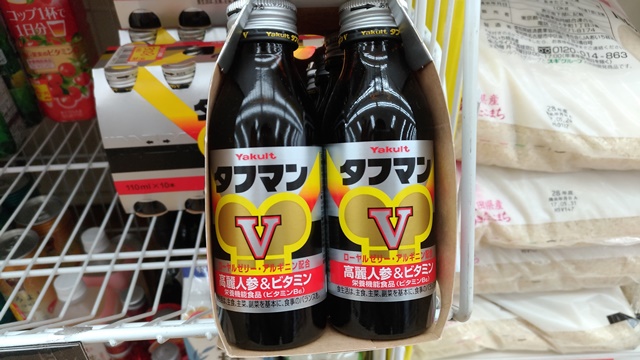
Tough Man is an energy drink sold by Yakult.
It comes in a 100ml brown glass bottle, as with most quasi-drug energy drinks.
The drink contains 1000mg of taurine, 5mg each of Vitamin B1, B2, and B6, 50mg of caffeine, 20mg of niacin, 20mg of nicotinamide, and 100mg of carnitine.
The drink also contains ginseng extract and royal jelly.
Usually, energy drinks of this sort contain caffeine but this drink is unique in that it does not contain any.
The taste is fruity and not medicinal at all. Overall, it is very easy to drink.
Oronamin C
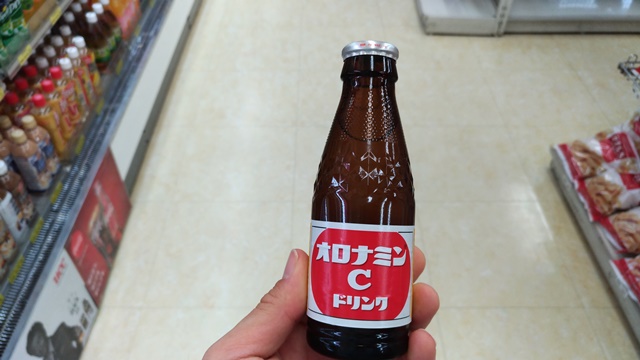
Oronamin C is a carbonated energy drink sold by Otsuka Pharmaceutical Company in Japan. The drink was first sold in February of 1965 and has been a long-seller ever since. The drink's slogan is (Genki Hatsuratsu) which basically means "lively vigor" which is also well known.
The drink comes in a distinctive glass bottle which has not changed much since the drink was first sold.
It also has a distinctive cap which can be removed by pulling the plastic lever connected to it.
The "C" in Oronamin C stands for vitamin C that is inside the drink.
The drink is also sold in South Korea.
The drink's ingredients are- 220mg of vitamin C, 2.4mg of vitamin B2, 4.9mg of vitamin B6, and 12mg of niacin.
The drink has a citrus candy-like taste much like that of PEZ. The fizz also makes the drink much more enjoyable than non-carbonated quasi-drug and pharmaceutical energy drinks.
*Post Scriptum- Aside from its medical-sounding name the drink is not classified as a "drug" and can be found in both convenience stores and drug stores.
Pepsi Refresh Shot
Pepsi Refresh Shot is a 200ml Pepsi drink with double the amount of caffeine as a normal Pepsi.
However, the amount of caffeine inside is just 38mg/200ml, which is not so much. To me, the taste was just like normal Pepsi; however, Pepsi claims that it is sweeter than the original one.
*Post Scriptum-
I am particularly sensitive to caffeine, so when I drank this Pepsi in the morning, it made me quite alert for the rest of the day.
I guess you can call this an energy drink.
New Guromont
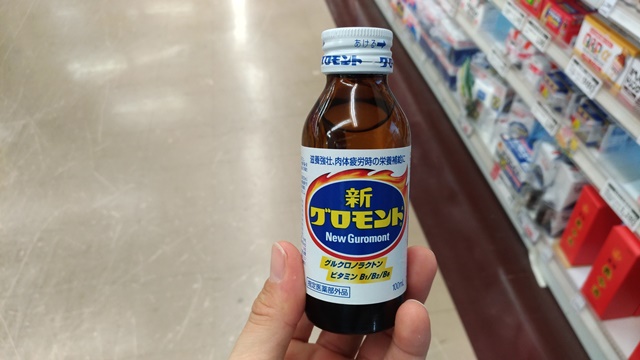 New Guromont or Shin Guromont is an energy drink sold by the Japanese pharmaceutical company, Lion. The taste of this energy drink is drinkable, without an unpleasant aftertaste like most Japanese energy drinks.
New Guromont or Shin Guromont is an energy drink sold by the Japanese pharmaceutical company, Lion. The taste of this energy drink is drinkable, without an unpleasant aftertaste like most Japanese energy drinks.
The Ingredients in the drink are, 1000mg of glucuronolactone, 10mg of Vitamin B1, 5mg of Vitamin B2, 5mg of Vitamin B6, 20mg of nicotinamide, 100mg of inositol, 100mg of carnitine, 30mg of caffeine, and 9mg of longan extract.
All of these ingredients except for the longan extract and glucuronolactone are common ingredients found in Japanese energy drinks.
The taste of this energy drink is acceptable, without an unpleasant aftertaste like most Japanese energy drinks.
Vitatime KO-W Solution
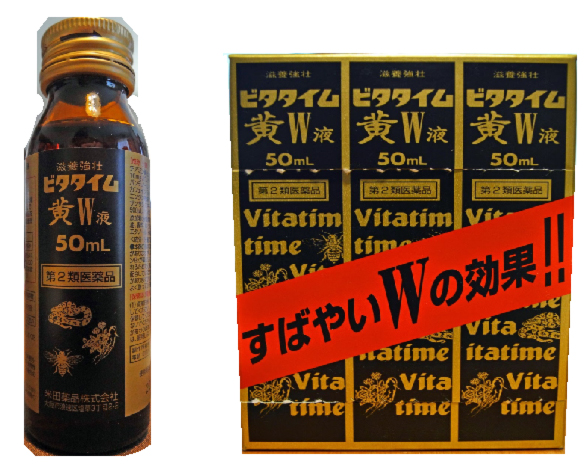
This energy drink is one of the sketchier ones as it is obviously a copy of Yunker Kotei Eki. is just one letter different from (Kotei Eki) in Japanese.
On the box, it even goes on to say that it has, "W(double) the effect" without going on to say of what, although it's quite obvious as to what product they are referring to.
This drink would fit into the category of Kanpoyaku(traditional Chinese medicine) as there are many natural and herbal drugs included.
On the bottle, there are three drawings, one of a honey bee, one of a Mamushi snake, and another of a ginseng plant. According to the ingredients list, the extracts of Mamushi and ginseng are included, thankfully the honey bees are not.
The honey bees represent the royal jelly that is included in the drink.
Other interesting ingredients include the extracts of a gallstone of a cow, which is pretty grosse, the Jiou plant, the Sanzashi plant, and the secreting fluid of Viverrinae(civet).
The sweetness of the drink tastes like that of honey, most likely due to the royal jelly. In addition, there is a taste of herbs and the unique and distinct flavor of Kanpoyaku.
There is also a spiciness to the drink that will give the consumer a tingling sensation in the throat.
Kyokyo Daha
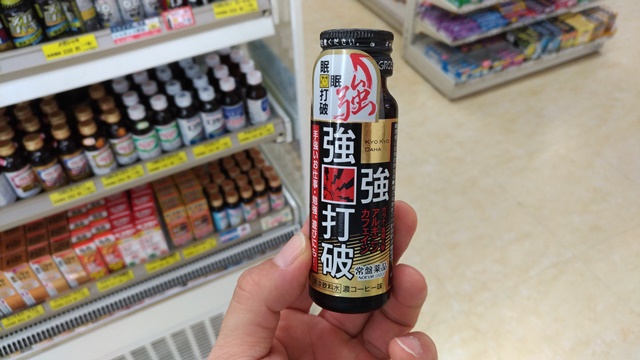
Kyokyo Daha is from the Tokiwa Pharmaceutical Company. This drink is not a pharmaceutical or a quasi-drug. This means that you can drink this more than one time a day even if you're younger than a 15-year-old. This drink has 150mg of caffeine and some other ingredients like ginseng extract.
I should avoid this one completely! It smells like old socks, and tastes horrible!
In short, one of the worst I've tasted in a while.
What are the real benefits of energy drinks?
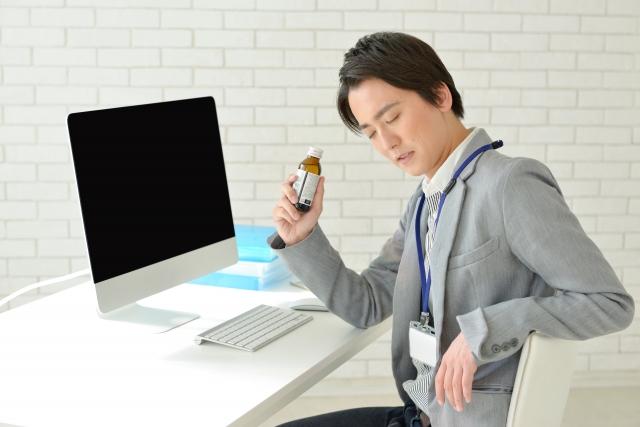
Most of the Japanese drinks tend not to contain caffeine only but are combined with vitamins such as B1, B2, B6, vitamin C, and vitamin E, just to mention a few.
The fact that Japanese people tend to be busy all the time, they need to consume something as they are on the move, for example on their way to work or just working in front of their desk.
The other reason why Japanese people drink energy drinks could be the fact that it contains vitamins and other supplements that could benefit their bodies and health.
